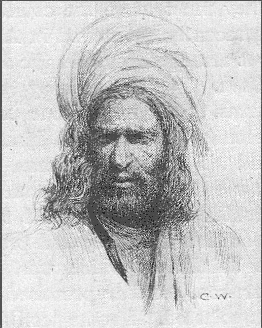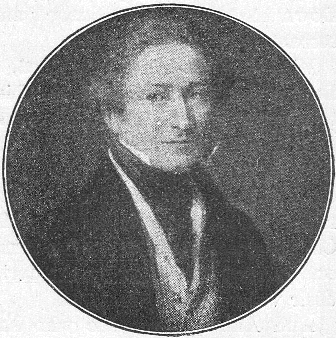Reign of Queen Victoria - M. B. Synge |
Troubles in India
The most important British possession at tins time was India. It was a smaller country than the India of to-day. It was not a land of white men, but a land of dark-hued natives, to which Englishmen went first to trade, then to conquer, then to govern.
We are not here concerned with the story of the conquest of India. At this time the Indian people were the subjects of the young Queen, though the country was governed by the East India Company, which had been formed for purposes of trade in the year 1600. Under the Company, numbers of young Englishmen went out to make new careers for themselves. Many became officers in naive regiments. Thither went young Arthur Wellesley, afterwards Duke of Wellington, Henry Lawrence and his two brothers, John Nicholson, and many others, whose names have been handed down as heroes. Some went out to trade, for here was a land destined to become eight times the size of the British Isles, with every variety of soil and climate. It produced cotton, rice, wheat, sugar, coffee, tea, silk, flax, spices, and many another article which could not be produced in the home country. Many a young Englishman made his name and his fortune in India at this time.
Difficulties arose in Afghanistan, a country lying between Persia and India, and governed by a native ruler—Dost Mahommed. As Persia and India were under British influence, each country was anxious to secure Dost Mahommed as a friend. In 1838, Britain, suspecting that he was being worked on by the Russians, dethroned Dost Mahommed, and crowned a friendly Prince in his stead. The new ruler was placed on the throne, and the British Army, thinking that its task was done, withdrew, leaving only some 8.000 men under the English minister, Macnaghtcn, together with Sir Alex ander Burnes, to watch over British interests at the new court.
 A TYPICAL AFGHAN. |
For a time all went well. Mahommed had given up his sword and surrendered himself to the British. But the new ruler was weak and unpopular, and gradually discontent broke into open rebellion. The Afghans attacked the house of Sir Alexander Burnes, drew their long knives, and slew him. Dost Mohammed's son, Akbar Khan, a fierce and revengeful man, now appeared upon the scene. He was a strong leader, and he had his country with him. Skirmish after skirmish took place, until Macnaghten was obliged to treat with him.
The Prince made heavy terms with the English. They must leave the country, and remove the ruler so recently enthroned in Afghanistan. An interview was arranged between the British minister and Akbar Khan. For a time they talked together on friendly terms. Suddenly Akbar drew from his belt a pistol, recently presented to him by Macnaghten himself, and shot the Englishman dead. Terror and weakness seized the little band of British left in the city of Kabul. They agreed to give up their guns on condition that they had provisions and a safe retreat to Jalalabad, which was being held by a British garrison. Akbar promised that they should depart unmolested. So the terrible retreat began. It was the 6th of January, 1812, the very heart of the Afghan winter. At nine o'clock on that dreary winter morning the British began their march. There were 4,500 soldiers, under British officers, with their wives and children; there were long trains of camels and camp-followers; sick folk were riding with the most fragile of the women and children—all were unconscious of the terrors before them.
The town of Kabul stands 6,000 feet above sea-level, and snow lay deep on plain and hill-side as they left the city. Two days' march over the snow-covered mountains reduced the numbers of the little British band before ever they reached the terrible Khyber Pass, which was to prove a death-trap. This great gorge was five miles long. It was so deep, so precipitous, and so gloomy, that the rays of the sun had never pierced it, even in the noonday. Down the deep centre dashed an ice-cold mountain torrent.
Weary, frost-bitten, terrified, the reduced little British band straggled into this awful pass, only to be greeted by a storm of rocks and stones hurled down on them by the wild Afghans at every opening. Men, women, children, camels, and horses crowded onwards in a confused mass, only to be killed by falling stones or crushed by frightened animals. Children were torn from the arms of their mothers and hacked to pieces by the furious Afghans before their very eyes.
And Akbar Khan—he who had promised a safe passage? He was there in person, but unable to stay the fury of his wild subjects, even if he would. He could only suggest that the women and children should be placed under his immediate care. It was their only chance of life, and the retreat went on without them. The snow was now stained with the blood of those who were left, the air rent with their groans and cries, while the Afghans fought them with their deadly knives.
By the time they were within sixteen miles of Jalalabad, only six persons remained out of the 16,000 who had left Kabul but six days before, One by one even these were killed by the blood-thirsty Afghans, until one man alone survived—Dr. Brydon still had strength to sit his weary horse. It was late on the afternoon of January 13 when, bleeding and utterly exhausted, he rode slowly through the Kabul Gate of Jalalabad to tell the story of disaster, of shame, and humiliation.
 SIR ROBERT PEEL. |
At Jalalabad, General Sale refused to yield when summoned to surrender by Akbar Khan. "I propose to hold this place on the part of the Government until I receive orders to the contrary," he said firmly to his troops. Akbar and his frantic Afghans hurled themselves against it in vain. By this staunch defence the honour of England was retrieved.
Meanwhile, a Tory Government, under Sir Robert Peel, had replaced Lord Melbourne's Whig ministry, and the new ministry demanded the abandonment of Afghanistan.